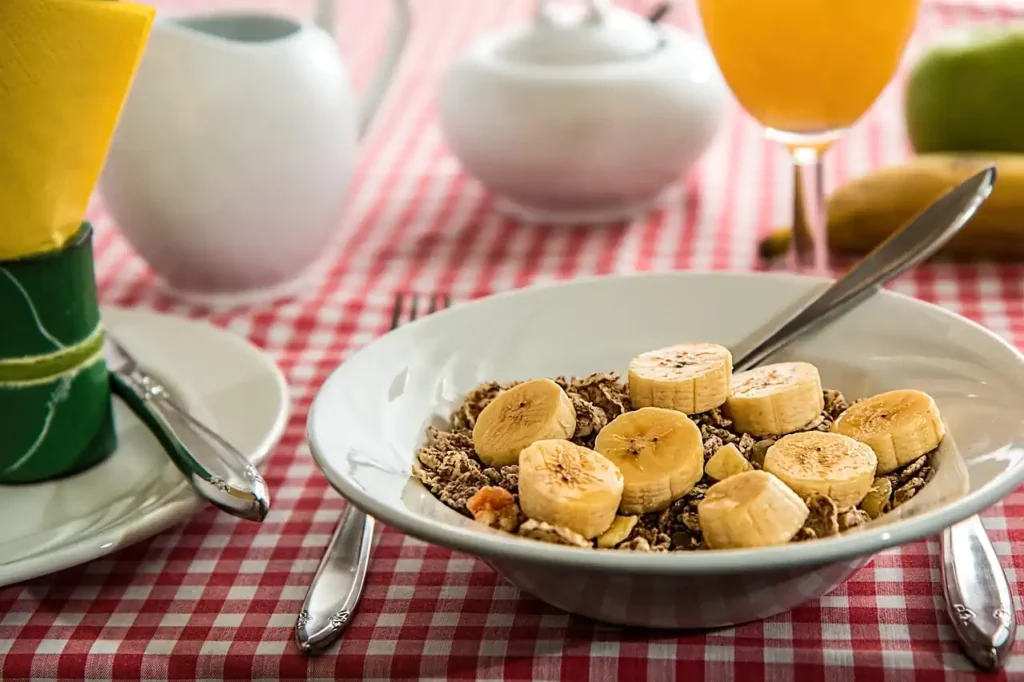How Can You Eat Well and Save Money When Living as a Student on a Tight Budget
How can you eat well and save money when living as a student on a tight budget? As a student on a tight budget, it can be challenging to balance the need to eat well with the need to save money. While it may be tempting to rely on cheap and unhealthy convenience foods, a poor diet can take a toll on your health, your mood, and your ability to focus on your studies.
However, there are many ways to eat well and save money as a student, from meal planning and shopping strategically to taking advantage of discounts and cooking in bulk. In this article, we will explore some practical tips and strategies for eating well on a budget, so that you can stay healthy and focused while you pursue your academic goals.
How can you eat well and save money when living as a student on a tight budget? (short version)
- Plan your meals
- Shop smart
- Cook in bulk
- Eat plant-based meals
- Make use of leftovers
- Avoid eating out
How Can You Eat Well and Save Money When Living as a Student on a Tight Budget

As a student, it can be challenging to eat well and stay within a tight budget. The temptation of eating out or buying pre-packaged meals can often lead to overspending, leaving little room for other expenses. However, with a little planning and creativity, it is possible to eat nutritious and delicious meals while still saving money.
So how can you eat well and save money when living as a student on a tight budget? By following these tips and strategies, you’ll not only save money but also develop a healthier and more sustainable approach to eating. You’ll learn how to make the most of your grocery budget, reduce food waste, and enjoy delicious and nutritious meals every day. So, let’s dive in and discover how you can eat well and save money as a student on a tight budget.
Plan Your Meals
When living on a tight student budget, meal planning can be an essential part of eating well and saving money. Not only does meal planning help you stay on track with your food choices, but it can also save you money by preventing impulsive and expensive grocery shopping trips or eating out.
The importance of meal planning:
Meal planning involves setting aside time to plan your meals and snacks for the week, which can help you avoid the temptation to buy processed or unhealthy food that can be more expensive and less nutritious. Meal planning can also help you save time and reduce food waste, as you can buy only the ingredients you need and avoid buying food that may go bad before you can use it.
Tips on how to create a budget-friendly meal plan that includes nutritious meals and snacks:
To create a budget-friendly meal plan, consider the following tips:
- Make a list of the meals and snacks you want to prepare for the week
- Look for recipes that use affordable, seasonal, and healthy ingredients
- Plan for meals that can be prepared in bulk and eaten as leftovers for lunch or dinner
- Use ingredients that can be versatile and used in different recipes
- Incorporate plant-based proteins like beans, lentils, and tofu, which tend to be more affordable than animal proteins
- Opt for whole grains like brown rice, quinoa, and oats, which are more filling and nutritious than processed grains
- Plan for meals that use ingredients that are on sale or in season
- Look for coupons or discount codes for the ingredients you need
- Shop at grocery stores that offer student discounts or rewards programs
Examples of healthy and cheap meal ideas:
Here are some examples of healthy and budget-friendly meal ideas that you can incorporate into your meal planning:
- Vegetable stir-fry with brown rice and tofu
- Lentil soup with whole-grain bread
- Quinoa salad with roasted vegetables and chickpeas
- Sweet potato and black bean tacos with avocado and salsa
- Pasta with tomato sauce, vegetables, and parmesan cheese
- Oatmeal with banana, peanut butter, and cinnamon
- Smoothie bowl with frozen fruit, yogurt, and granola
By planning your meals and snacks, you can make sure that you have the right ingredients on hand, which can help you avoid the temptation to buy unhealthy food or eat out. With a little effort and creativity, you can eat well and save money on a student budget.
Shop Smart

In addition to meal planning, smart grocery shopping is another important strategy to eat well and save money on a student budget. Smart grocery shopping involves making informed decisions about what to buy and where to buy it, in order to get the best value for your money.
Importance of smart grocery shopping:
Smart grocery shopping can help you save money by finding deals and discounts on the foods you need. It can also help you make healthier food choices by choosing whole, unprocessed foods that tend to be less expensive than their processed counterparts.
Tips on how to find deals and discounts:
Here are some tips on how to find deals and discounts on groceries:
- Check the weekly ads and sales flyers from your local grocery stores
- Look for discount grocery stores, such as Aldi or Lidl, that offer low prices on quality food items
- Consider buying in bulk from stores like Costco or Sam’s Club, but only if you can use the products before they expire
- Use cashback apps and websites like Ibotta and Rakuten to earn money back on your grocery purchases
- Join loyalty programs for your favorite grocery stores to earn rewards and discounts
Ways to shop for groceries on a budget, including shopping at discount stores and using coupons:
To shop for groceries on a budget, consider the following strategies:
- Make a grocery list and stick to it, to avoid impulse purchases
- Buy generic or store-brand products, which are often less expensive than name-brand products
- Choose whole foods like fruits, vegetables, and grains, which tend to be less expensive than processed and packaged foods
- Shop at discount grocery stores or ethnic markets, where you can find quality food items at lower prices
- Use coupons and discount codes to save money on your purchases
- Shop for groceries online to take advantage of digital coupons and compare prices across different stores
By shopping smart and looking for deals and discounts, you can save money on your grocery bill while still buying nutritious foods. With a little bit of planning and research, you can find the best deals and make the most of your student budget.
Cook in Bulk
Cooking in bulk is a great strategy for saving both time and money on your meals. By preparing large batches of food at once, you can minimize your time in the kitchen while still having plenty of meals to enjoy throughout the week.
How cooking in bulk can save time and money:
Cooking in bulk can save time by allowing you to prepare multiple meals at once, rather than having to cook every meal from scratch. It can also save money by allowing you to buy ingredients in larger quantities, which often means a lower cost per serving.
Ideas for meals that can be cooked in bulk and frozen for later:
Here are some meal ideas that can be easily cooked in bulk and frozen for later:
- Chili or soup: these hearty dishes are easy to make in large quantities and can be frozen in individual portions for quick, easy meals later on
- Casseroles: casseroles can be made in large baking dishes and portioned out for multiple meals
- Stir-fry: stir-fry dishes can be made with a variety of vegetables and proteins, and can be easily stored in the freezer
- Pasta dishes: pasta dishes like spaghetti or lasagna can be made in large quantities and frozen in individual portions
Tips on how to safely store and reheat frozen meals:
To safely store and reheat frozen meals, follow these tips:
- Let the food cool down before placing it in the freezer
- Label the containers with the date and contents, so you know what you’re thawing and how long it’s been in the freezer
- Use freezer-safe containers to avoid freezer burn and other quality issues
- Thaw the meals in the refrigerator overnight before reheating them
- Reheat the meals thoroughly, making sure they reach an internal temperature of 165°F to prevent foodborne illness
Cooking in bulk can be a great way to save both time and money on your meals, while still enjoying nutritious and delicious food. By following these tips for meal prep and storage, you can create a variety of meals to enjoy throughout the week, without breaking the bank.
Eat Plant-Based Meals

Eating plant-based meals is not only good for the planet, but it can also be a great way to save money on your grocery bill. By relying on plant-based protein sources instead of meat, you can significantly reduce your food expenses.
Plant-based meals can be more budget-friendly than relying on meat:
Meat is often the most expensive part of a meal. Plant-based protein sources like lentils, beans, and tofu are much cheaper per serving than meat. By incorporating these ingredients into your meals, you can significantly reduce your grocery bill. Additionally, fruits and vegetables tend to be less expensive than animal products and can provide a variety of essential nutrients.
Ideas for cheap and healthy vegetarian and vegan meals:
Here are some affordable and nutritious vegetarian and vegan meals to try:
- Lentil soup: lentils are an excellent source of plant-based protein and fiber, making them a filling and nutritious addition to any meal
- Chickpea curry: canned or dried chickpeas are a cheap and versatile ingredient that can be used in a variety of dishes, including curries, stews, and salads
- Tofu stir-fry: tofu is a great source of plant-based protein and can be used in a variety of dishes, including stir-fries, salads, and sandwiches
- Veggie burrito bowl: a burrito bowl can be made with a variety of affordable and nutritious ingredients, including rice, beans, veggies, and salsa
The health benefits of a plant-based diet:
In addition to being budget-friendly, a plant-based diet can offer a variety of health benefits. Plant-based foods tend to be rich in fiber, vitamins, and minerals, which can promote good digestive health, healthy weight management, and reduce the risk of chronic diseases. Additionally, plant-based diets have been associated with lower rates of heart disease, cancer, and diabetes.
By incorporating more plant-based meals into your diet, you can save money and improve your overall health. Whether you’re a vegetarian or just looking to reduce your meat intake, there are plenty of affordable and delicious plant-based meals to try.
Make Use of Leftovers
Food waste is not only harmful to the environment, but it can also be costly. By making use of your leftovers, you can save money and reduce your environmental impact. Here are some tips for making the most of your leftovers:
Importance of not wasting food:
Throwing away food that could have been eaten is not only wasteful, but it also wastes the money you spent on it. By using up your leftovers, you can reduce your food waste and save money on groceries. Additionally, reducing food waste can help to combat climate change by reducing the amount of methane gas produced by rotting food in landfills.
Repurpose leftovers into new meals and snacks:
Leftovers can be repurposed into new meals and snacks in a variety of ways. For example, leftover roasted vegetables can be used in a frittata or as a topping for a salad. Leftover chicken can be used to make chicken salad or added to a soup. Additionally, leftover rice can be used to make fried rice or added to a stir-fry.
Store leftovers safely and how to reheat them properly:
It’s important to store leftovers in airtight containers and to label them with the date they were cooked. Leftovers should be stored in the refrigerator and consumed within three to four days. To reheat leftovers, use a microwave or an oven and be sure to heat them to a temperature of 165°F (74°C) to ensure they are safe to eat.
In conclusion, making use of leftovers is an excellent way to save money, reduce food waste, and promote sustainability. By following these tips, you can make the most of your food and reduce your environmental impact.
Avoid Eating Out

Eating out can be tempting when you’re a student with a busy schedule, but it can be expensive and unhealthy. Here’s why and how to limit eating out:
Eating out can be expensive and unhealthy:
Eating out at restaurants and fast-food chains can be expensive, especially if you’re doing it frequently. Moreover, these foods are often high in calories, unhealthy fats, and added sugars, which can increase your risk of chronic diseases such as obesity, heart disease, and type 2 diabetes.
Limit eating out by packing your own lunches and snacks:
One way to limit eating out is to pack your own lunches and snacks. This can save you money and ensure that you’re eating nutritious foods. Try to plan your meals and snacks in advance, and make sure to include foods from all food groups such as fruits, vegetables, whole grains, lean protein, and healthy fats. You can also use reusable containers and bottles to reduce waste and save money.
Tips on how to make healthy choices when eating out:
If you do eat out, try to make healthy choices by opting for dishes that are high in nutrients and low in calories, unhealthy fats, and added sugars. Choose foods that are grilled, baked, or steamed rather than fried, and ask for sauces and dressings on the side. You can also share a meal with a friend or take half of it home to reduce portion sizes and save money.
In conclusion, avoiding eating out and packing your own lunches and snacks can be an effective way to save money and eat healthier. By making small changes to your eating habits, you can improve your health and reduce your expenses.
Best Places To Shop Cheap Food
Here is a small list of the top 10 places to shop cheap food in the USA:
- Aldi
- WinCo Foods
- Lidl
- Food 4 Less
- H-E-B
- Market Basket
- Trader Joe’s
- Costco
- Walmart
- Sam’s Club
Note: This list is based on affordability and availability of inexpensive food options, and may vary depending on location and personal preferences.
What’s The Cheapest Way To Eat?

The cheapest way to eat will vary depending on your location, food preferences, and dietary requirements. However, in general, some of the most cost-effective ways to eat include cooking meals at home, eating a plant-based diet, and buying food in bulk.
Cooking meals at home is often much cheaper than eating out or buying pre-packaged meals. By planning your meals in advance and buying ingredients in bulk, you can save money and ensure that you always have nutritious and delicious food on hand. It is also a great way to avoid food waste by using up leftovers and repurposing ingredients in creative ways.
Eating a plant-based diet can also be a cost-effective option, as vegetables, fruits, legumes, and grains are typically less expensive than meat and dairy products. There are many tasty and nutritious vegetarian and vegan recipes available online that can help you save money and still enjoy delicious meals.
Finally, buying food in bulk can be an excellent way to save money on groceries. Consider purchasing staples like rice, beans, and oats in large quantities, as they have a long shelf life and can be used in a variety of meals. Shopping at bulk stores or buying in bulk online can also help you save money in the long run.
In summary, the cheapest way to eat is to cook at home, eat a plant-based diet, and buy food in bulk. By incorporating these strategies into your meal planning and grocery shopping, you can save money and still enjoy healthy and delicious meals.
Conclusion
Eating well on a student budget can be challenging, but it’s not impossible. By incorporating these tips in this article about how can you eat well and save money when living as a student on a tight budget and putting all these tips into your lifestyle, you can save money and still enjoy nutritious and delicious meals.
Remember, every small change can make a big difference. By taking the time to plan your meals, shop smart, and cook in bulk, you can save money and eat healthier. And don’t forget to make use of leftovers and avoid eating out to reduce expenses and improve your health.
By taking a proactive and mindful approach to your diet, you can achieve your health and financial goals while still enjoying delicious and nutritious food.
Related:







